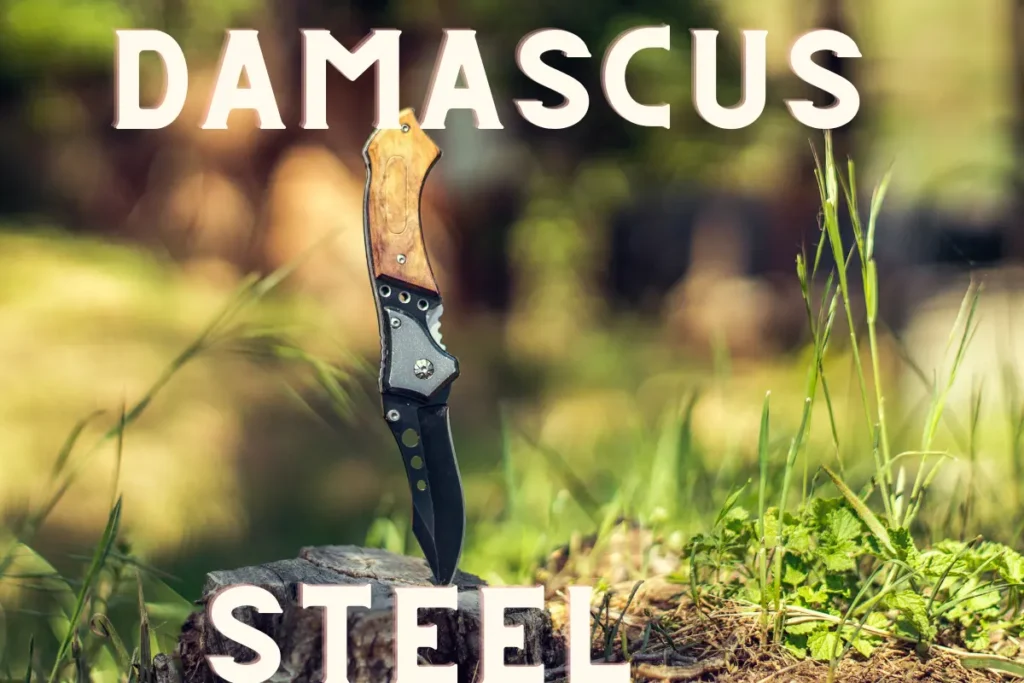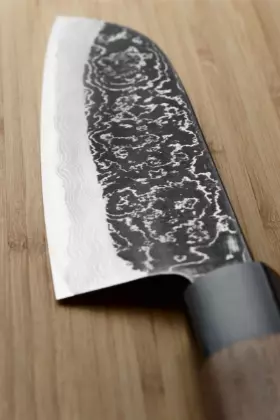Welcome to the world of high-end culinary tools, where quality can dramatically elevate your cooking experience. Today, we’ll venture into the rich, storied universe of Damascus steel and uncover the unseen benefits it brings to your kitchen. Renowned for its resilience, sharpness, and distinct pattern, Damascus steel has become a coveted material among culinary enthusiasts. But what makes it truly special? Let’s delve in and discover.
Table of Contents
A History of Damascus Steel
Originating from ancient Syria in a city of the same name, Damascus Steel has a history steeped in mystique. Forged through a process of layering and folding iron and steel, the earliest Damascus steel swords were known for their exceptional strength and sharpness. This remarkable quality found its roots in a combination of raw materials and masterful blacksmithing techniques.
The Damascus steel we see today is a tribute to this ancient art. Modern Damascus is a layered steel that leverages the advantages of different types of steel to create a blade with a balance of strength, flexibility, and sharpness. With every fold and forge, the steel’s layers increase exponentially, imbuing each blade with its unique pattern – a testament to its rich history.
The Aesthetic Appeal of Damascus Steel
One of the most distinguishing features of Damascus steel is its characteristic surface pattern. Swirls and waves course through the metal, reminiscent of flowing water or a landscape seen from above. This pattern is not simply a decorative overlay but emerges from the steel’s layered structure.
This means that no two Damascus steel blades are identical – each knife is a unique piece of art. The aesthetic appeal of these knives is undeniable. A Damascus knife can transform a kitchen from a purely utilitarian space into an environment that inspires creativity and passion. As much a conversation starter as a cooking implement, a Damascus blade exudes sophistication and luxury.
The Science Behind Damascus Steel
At its core, Damascus steel is a type of high-carbon steel. But it’s not just any high-carbon steel. This extraordinary material owes its superior performance to the fusion of two or more types of steel, typically a harder high-carbon one and a tougher, lower-carbon one. When these metals are repeatedly folded and forged together, they form hundreds, even thousands, of alternating layers.
This process, while labor-intensive, leads to a blade that shares the benefits of both the harder steel: a cutting edge that stays sharp for longer, and flexibility that ensures durability. The distinct Damascus pattern is a visual representation of these combined layers of steel, a reminder of the strength that lies within each elegant tool.
In the following sections, we will dig deeper into the practical advantages of Damascus steel in the kitchen – from its unmatched durability to its precision in every cut. Stay tuned as we continue our exploration of this remarkable material’s unseen benefits.
Damascus Steel in the Kitchen: Durability and Edge Retention
An essential component of an exceptional culinary experience is the tool you use. Damascus steel, known for its unparalleled durability, stands the test of time. The combination of layered high and low carbon steel gives Damascus knives a toughness that’s hard to find elsewhere, resisting chipping and brittleness even with heavy use.
But durability is not all Damascus Steel offers. The hardness derived from the high carbon steel layers allows these knives to have excellent edge retention. This means they stay sharp far longer than knives made from standard stainless steel. No more frequent sharpening; with Damascus steel, you can enjoy a consistently sharp edge for a superior cutting experience.
Precision and Performance in Food Preparation
Damascus steel’s extraordinary sharpness has a significant impact on your food preparation. A sharper knife means cleaner, more precise cuts. And precision in cutting doesn’t just affect the aesthetics of your ingredients; it plays a role in the taste and texture of your dishes too.
Cleanly cut vegetables and proteins preserve their juices better, ensuring the flavor stays within the food instead of being left behind on the cutting board. Moreover, the same-size pieces result in even cooking, which is crucial for recipes that require exact cooking times. Damascus steel can help elevate the taste and presentation of your meals, thereby enhancing your culinary experience.
Safety and Comfort
A less-known but crucial aspect of Damascus steel knives is their contribution to kitchen safety. A sharp, well-balanced knife is actually safer than a dull one. Dull knives require more force to cut, increasing the risk of the knife slipping off the food and causing an accident.
Damascus steel knives typically come with well-balanced handles that feel comfortable in your hand. This balance provides better control over the knife, allowing you to make smooth, effortless cuts. It reduces hand and wrist fatigue, especially important during long cooking sessions or when preparing large meals.
Maintenance and Care for Damascus Steel Knives
While Damascus steel knives are impressively durable and retain their sharpness for a long time, they are not entirely maintenance-free. To keep your knife in its best condition, always hand-wash and dry it promptly to prevent any potential for rust or staining.
Honing your knife with honing steel before or after each use will help maintain its edge. But remember, honing is not a substitute for sharpening. Even Damascus steel will eventually need sharpening; it just won’t be as frequent as with other knives. When the time comes, consider getting it professionally sharpened to preserve the blade’s integrity.
Finally, storing your Damascus steel knife in a knife block, sheath, or magnetic knife strip can protect the blade from accidental damage and ensure its longevity.
Stay tuned for the next section, where we will guide you on how to choose the perfect Damascus steel knife for your culinary needs. We hope that these insights help you appreciate the unseen benefits Damascus Steel can bring to your kitchen and your overall cooking experience.
Choosing Your Damascus Steel Knife
Investing in a Damascus steel knife is an investment in quality, performance, and aesthetics. However, not all Damascus knives are created equal. It’s crucial to understand your specific needs and preferences to make the best choice.
Consider the knife’s size and shape. A chef’s knife is a versatile choice, but you might also consider specialized knives like a paring or slicing knife. The blade length should match your comfort level and the tasks you frequently perform.
Examine the knife’s balance. It should feel comfortable and controlled in your hand. The handle material and design are also critical for comfort and durability. Look for high-quality materials like hardwood, micarta, or stainless steel.
Consider the steel quality and pattern. Some Damascus steel knives are more about the look than performance. Ensure that your choice is crafted from high-quality steel that offers excellent edge retention and durability.
Lastly, consider the knife’s origin and warranty. Many reputable manufacturers stand by their products with comprehensive warranties, a sign of their trust in their craftsmanship.
Conclusion: The Unseen Culinary Edge
Through our exploration of Damascus steel, we’ve uncovered its many unseen benefits, from superior durability and sharpness to aesthetic appeal and safety. The journey of a Damascus steel knife from raw steel to your kitchen encapsulates centuries of tradition, craftsmanship, and technological advancements.
Adopting a Damascus steel knife into your culinary routine is an investment not just in a tool, but in an enriched cooking experience. It goes beyond functionality to become a centerpiece of your kitchen, a topic of conversation, and a source of inspiration. The unseen benefits are as layered and intricate as the Damascus pattern itself.
FAQs about Damascus Steel
To wrap up, let’s answer some of the frequently asked questions about Damascus steel knives.
Q: Are Damascus steel knives expensive? A: While Damascus steel knives can be pricier than standard knives due to their quality and craftsmanship, there are options for different budgets. Always consider it as an investment in quality and longevity.
Q: Where can I buy Damascus steel knives? A: Damascus steel knives are available at high-end kitchen stores, some department stores, and online. Always buy from reputable sources to ensure authenticity and quality.
Q: How do I sharpen a Damascus steel knife? A: A professional knife sharpener is recommended for the best results. But if you’re comfortable doing it yourself, use a high-quality sharpening stone and follow the knife’s original bevel angle.
Q: Is Damascus steel rustproof? A: Although Damascus steel has good corrosion resistance, it is not completely rust-proof. Proper care, like cleaning and drying your knife after use, is necessary to prevent rust.
Remember, Damascus steel knives aren’t just a purchase; they’re an investment in your culinary journey. Enjoy the rich history, superior performance, and unmatched beauty they bring to your kitchen.



